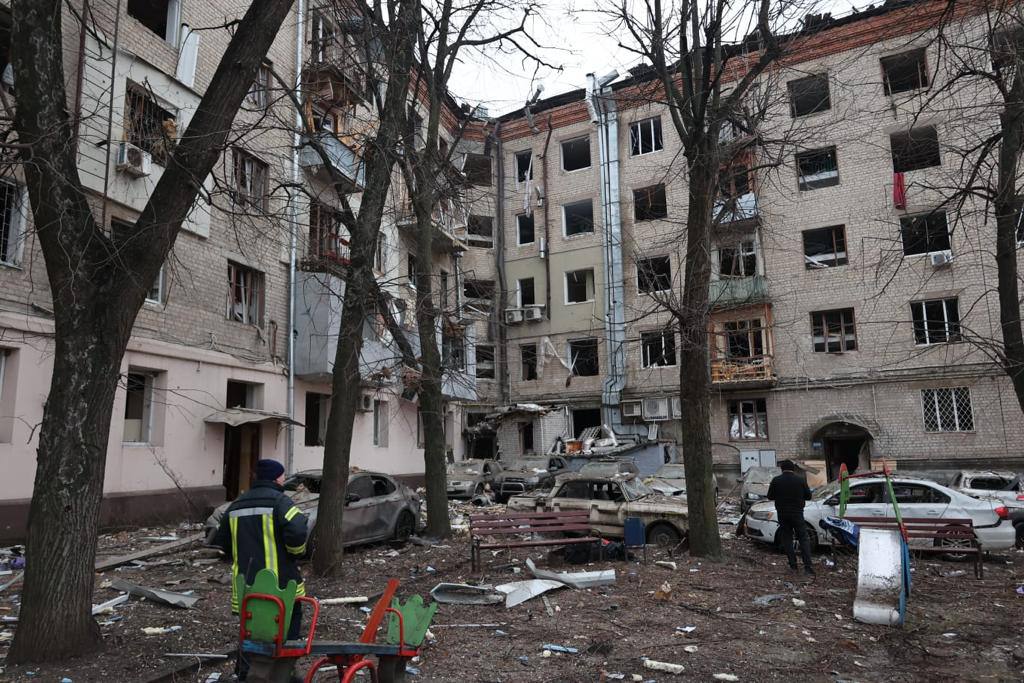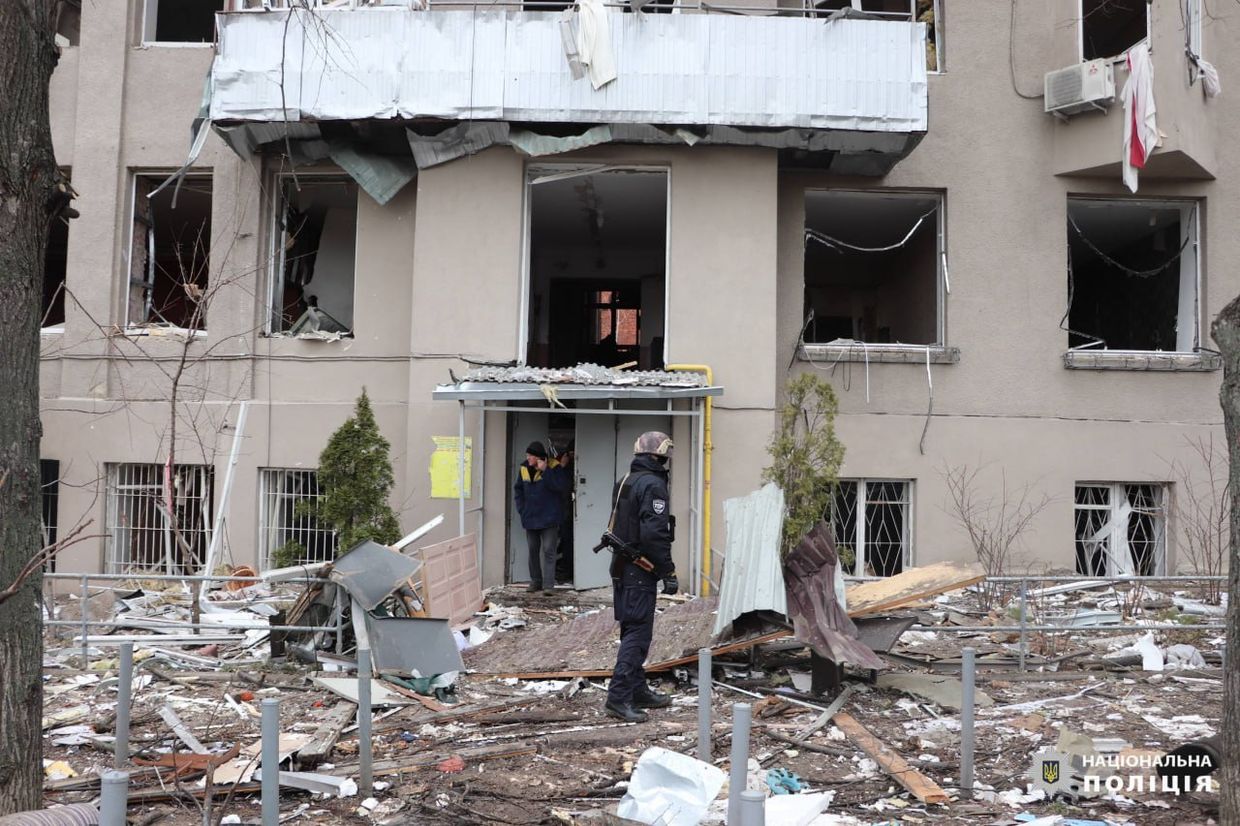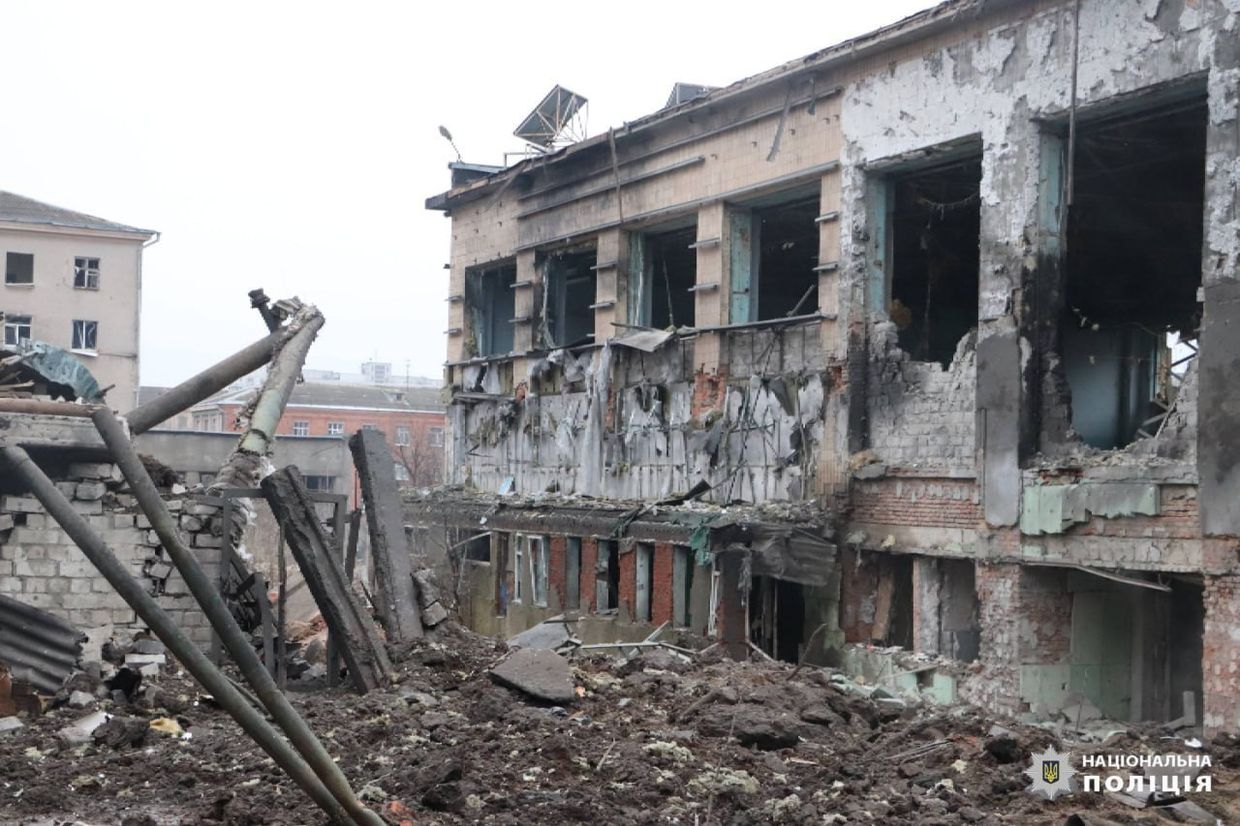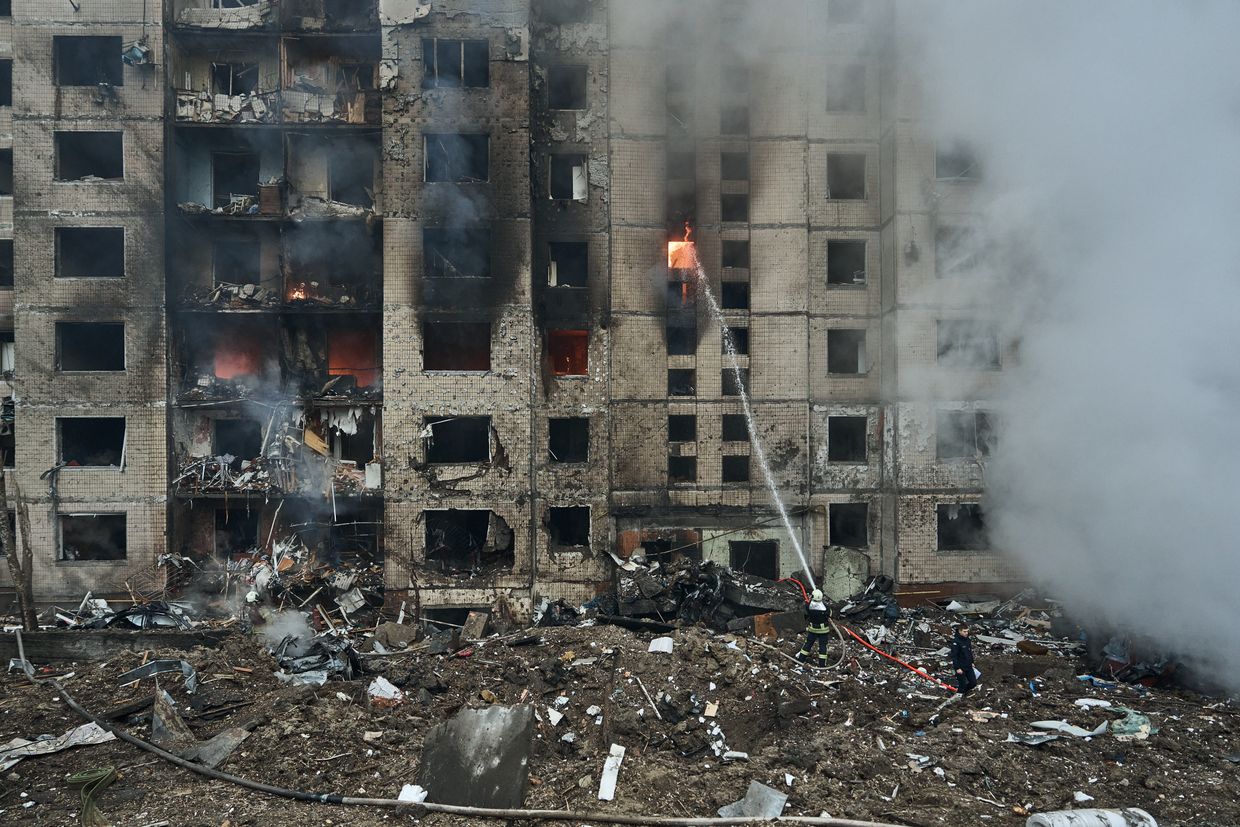Daily Flyer - January 2, 2024
A voice of Ukraine to the West

Russia launches mass missile strikes against Kyiv, Kharkiv


In a harrowing turn of events, Russia initiated a large-scale missile attack against Ukraine in the early hours of January 2, targeting key locations including Kyiv, Kyiv Oblast, and Kharkiv. Local officials reported tragic consequences, with at least two women killed and nearly 70 people sustaining injuries.

Kyiv:
Kyiv, the capital of Ukraine, bore the brunt of the assault, experiencing a multi-faceted attack that left a trail of destruction in its wake. A missile strike damaged a multi-story building, resulting in a fire that led to 27 hospitalizations and the unfortunate death of an elderly woman in an ambulance. The State Emergency Service facilitated the evacuation of 130 residents from the affected building.
Various districts within Kyiv faced additional challenges as fires broke out in the Podilskyi district, a warehouse ignited in the Obolonskyi district, and a high-rise building suffered damage in the Pecherskyi district. A supermarket in the Desnianskyi district also caught fire. Mayor Vitali Klitschko reported that a social infrastructure facility in the Sviatoshynskyi district was hit, further compounding the city's woes. Moreover, several districts experienced power outages, leaving facilities and residential buildings without electricity.
Drone Assault and Cruise Missile Barrage:
The assault on Kyiv began with approximately 15 Shahed "kamikaze" drones, all of which were reportedly neutralized. Subsequently, Kyiv faced a barrage of Kh-101/555/55 cruise missiles launched from over 10 Tu-95MS bombers. Serhii Popko, the head of the Kyiv military administration, disclosed that during the missile onslaught, more than 10 MiG-31 aircraft launched Kh-47M2 Kinzhal ballistic missiles against the capital.
Ukrainian air defenses responded valiantly, downing around 60 Kh-101/555/55 cruise missiles and ten Kinzhal missiles, according to Popko. The capital's resilience in the face of such a coordinated attack showcased the effectiveness of Ukraine's defense mechanisms.

Kharkiv also Targeted:
The city of Kharkiv, specifically the Shevchenkivskyi district, was not spared from the aggression. Governor Oleh Syniehubov reported that one woman lost her life, and 41 people were injured in the missile strike, with 17 victims being hospitalized.
As the dust settles, the full extent of the damage and casualties is yet to be determined. This recent assault follows a mass air attack by Russia on December 29, which claimed the lives of 40 people and injured over 160 others. Ukrainian officials had previously cautioned that Russia might intensify its assaults on Ukraine's cities and infrastructure during the winter, mirroring strategies employed in the past.
The unprovoked and devastating missile attack by Russia has left a scar on Ukraine, affecting both its capital and other key cities. The resilience displayed by Ukrainian forces in repelling the assault underscores the determination of the Ukrainian people to defend their sovereignty. As the international community watches these events unfold, concerns about the ongoing conflict and its potential escalation persist, raising urgent calls for diplomatic intervention and a peaceful resolution.
Russian attack injures 52 in Kharkiv, including 6 children

In a tragic turn of events, Russia launched a large-scale missile attack against Ukraine on January 2, resulting in devastating consequences. The assault targeted key areas including Kyiv, the surrounding region, and Kharkiv. The latest reports from Ukraine's National Police indicate a significant rise in the number of casualties, with 52 civilians injured in Kharkiv, including six children, as of 3 p.m. One woman lost her life in the attack, marking a grim escalation of violence in the region.
Details of the Attack:
The National Police revealed that Russia employed Iskander ballistic missiles in the assault on Kharkiv, causing at least three explosions in the city starting from 7:30 a.m. The wounded children, four boys, and two girls aged 6-13, highlight the indiscriminate nature of the attack, affecting the most vulnerable members of the community.

Ukraine's Air Force reported a staunch defense effort, with a total of 72 Russian missiles intercepted over the country. The intercepted missiles included 59 Kh-101/555/55 cruise missiles, three Kalibr cruise missiles, and all 10 Kh-47M2 Kinzhal air-launched ballistic missiles. The use of various missile types indicates the complexity and intensity of the assault.
The attack began with a wave of Shahed "kamikaze" drones, numbering at least 99, preceding the launch of missiles by Russian forces. The coordinated nature of the assault raises concerns about the strategic planning and execution by the aggressor.
This recent missile attack follows a mass air assault by Russia on December 29, which claimed the lives of 40 people and left over 160 others injured. Ukrainian officials had previously warned of Russia's potential intensification of attacks during the winter months, echoing a strategy employed in the past.
As the casualties mount and the scale of destruction becomes apparent, the international community is growing increasingly alarmed. Urgent calls for diplomatic intervention and a peaceful resolution to the conflict are reverberating worldwide. The indiscriminate targeting of civilians, including children, underscores the need for immediate action to halt the bloodshed and prevent further humanitarian crises.
The Russian missile attack on Ukraine has led to a tragic loss of life, injuries, and widespread destruction. The international community must unite in condemning these acts of aggression and work towards finding a diplomatic solution to the ongoing conflict. The resilience of the Ukrainian people in the face of adversity deserves acknowledgment, and concerted efforts are needed to bring about an end to the violence and pave the way for lasting peace in the region.
Baltic leaders call for more air defense systems for Ukraine after Russia's latest attack

In the wake of Russia's large-scale missile attack against Ukraine on January 2, Lithuanian President Gitanas Nauseda and Latvian President Edgars Rinkevics are calling for urgent international assistance to bolster Ukraine's air defense capabilities. As the conflict escalates, the Baltic leaders emphasize the need for swift action to protect Ukrainian civilians and critical infrastructure from further devastation.
Lithuanian President Gitanas Nauseda's Call to Action:
President Nausea took to social media, stating, "Ukrainians do wonders with the air defense the West has provided, but they need more. Air defense systems to Ukraine now!" His plea underscores the resilience of the Ukrainian people in the face of aggression and highlights the importance of reinforcing their defense capabilities to counter the ongoing threat.
Latvian President Edgars Rinkevics Urges Swift Assistance:
President Rinkevics echoed the sentiment, acknowledging the Ukrainian air defense system's effectiveness but stressing the immediate need for additional support. "Ukrainian air defense works well, but Ukraine must get more help," Rinkevics posted on social media, emphasizing that the time for swift and decisive action is now.
Call to Action After New Year Celebrations:
President Rinkevics urged the international community to move beyond New Year's celebrations and take concrete steps to aid Ukraine. "New Year’s celebrations are over, and the West must get serious and act now," he declared. His message's urgency reflects the situation's critical nature and the need for international solidarity in responding to the ongoing crisis.
Russian Missile Attack and Ukrainian Response:
The Russian missile attack on Ukraine, targeting Kyiv, the surrounding region, and Kharkiv, has resulted in a grim toll. At least five people have lost their lives, and 119 individuals, including children, have been reported injured by the State Emergency Service as of 4 p.m. The attack indiscriminately struck critical infrastructure, as well as industrial, civilian, and military facilities.
Despite the severity of the assault, Ukraine's Air Force reported the successful interception of 72 Russian missiles. Among the intercepted missiles were 59 Kh-101/555/55 cruise missiles, three Kalibr cruise missiles, and all 10 Kh-47M2 Kinzhal air-launched ballistic missiles. The coordinated effort of Russian forces, involving at least 99 missiles and a wave of Shahed "kamikaze" drones, underscores the multifaceted nature of the attack.
President Rinkevics expressed his outrage over the continued attacks on Kyiv, condemning them as "brutal Russian air strikes" resulting in the victimization of innocent civilians. As the international community bears witness to the escalating violence, there is a growing call for united action to address the crisis and safeguard the sovereignty of Ukraine.
The urgent appeal from Baltic leaders Nauseda and Rinkevics emphasizes the immediate need for enhanced air defense systems to protect Ukraine from further aggression. As the world watches the unfolding tragedy, the call for international support becomes more pressing than ever, underscoring the collective responsibility to stand against acts of violence and uphold the principles of peace and stability in the region.

